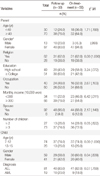Abstract
Purpose
This study has attempted to comparatively analyze the parenting stress that parents of a child with leukemia and their information needs at the end of treatment after complete remission (CR) of leukemia.
Methods
For data collection, a structured questionnaire survey on parenting stress and information needs was conducted using parents of children with leukemia visiting the Blood & Marrow Transplantation Center at C University Hospital in Seoul from August to December 2011. A total of 100 parents were examined.
Results
The parents of children under treatment after CR had greater parenting stress than parents of children whose treatment was finished. The parents of children whose treatment was finished had greater information needs than the parents of children whose treatment was ongoing. The differences had no statistical significance. In both groups, information needs about patients' growth development and school adjustment was high.
References
1. Korea Central Cancer Registry Center. 2009 National Cancer Registry Statistics. Ministry of Health & Welfare. Accessed June 1, 2012. http://www.cancer.go.kr/ncic/cics_g/cics02/cics_g027/1653504_6065.html.
2. Pui CH, Relling MV, Downing JR. Mechanism of disease, acute lymphoblastic leukemia. N Engl J Med. 2004. 350:1535–1548.
3. Sung JY. Leukemia clinic. 2004. 2nd ed. Seoul: Koonja Press.
4. Koo HY, Choi SH, Park HR. Physical conditions and social adaptation of children who have undergone hematopoietic stem cell transplantation. J Korean Acad Child Health Nurs. 2006. 12:441–450.
5. Ban JY, Park HR, Shong KY. Hope and related bariables in parents undergoing hematopoietic stem cell transplantation for leukemia. J Korean Oncol Nurs. 2005. 5:116–125.
6. Lee SY, Park HR. Depression and depression relating variables in hematopoietic stem cell transplantation recipients with leukemia. J Korean Acad Psychiatr Ment Health Nurs. 2006. 15:89–98.
7. Rabineau KM, Mabe A, Vega RA. Parenting stress in pediatric oncology populations. J Pediatr Hematol Oncol. 2008. 30:358–365.

8. Pakakasama S, Veerakul G, Sosothikul D, Chainansamit SO, Laosombat V, Thanarattanakorn P, et al. Late effects in survivors of childhood acute lymphoblastic leukemia: a study from Thai Pediatric Oncology Group. Int J Hematol. 2010. 91:850–854.

9. Oh KS, Sim MK, Son SY. Health problem and psychosocial adaptation of children with cancer. J Korean Acad Nurs. 2003. 33:293–300.

10. Waber DP, Silverman LB, Mullenix PJ. Cognitive sequelae in children treated for acute lymphoblastic leukemia with dexametasone or prednisone or prednisone. J Pediatr Hematol Oncol. 2000. 22:206–213.

11. Jin JH. School reentry experience of childhood cancer early survival children. J Korean Oncol Nurs. 2001. 1:118.
12. Colletti CJ, Wolfe-Christensen C, Carpentier MY, Page MC, McNall-Knapp RY, Meyer WH, et al. The relationship of parental overprotection, perceived vulnerability, and parenting stress to behavioral, emotional, and social adjustment in children with cancer. Pediatr Blood Cancer. 2008. 51:269–274.

13. Christiansen N, Taylor KM, Duggan C. Oral chemotherapy in paediatric oncology in the UK: problems, perceptions and information needs of parents. Pharm World Sci. 2008. 30:550–555.

14. Mu P, Ma F, Hwang BM, Chao Y. Families of children with cancer: The impact on anxiety experienced by fathers. Cancer Nurs. 2002. 25:66–73.

15. Shin JH, Shim HW. The mediation effect of parenting attitude between maternal caring stress and social competence of child-adolescent cancer patients. Korean J Youth Stud. 2011. 18:117–140.
16. Oh JA. Children's health and learning needs ax perceived by mothers of children with leukemia in attendance at a children's hospital school. J Korean Acad Child Health Nurs. 2006. 12:160–169.
17. Faul F, Erdfelde E, Buchner A, Lang AG. Statistical power analyses using G*Power 3.1: Tests for correlation and regression analyses. Behav Res Methods. 2009. 41:1149–1160.

18. Abidin RR. Parenting stress index short form(PSI/SF). 1990. Charlottessville, VA: Pediatric Psychology Press.
19. Kim H. The relations of maternal parenting stress, parenting efficacy, and parenting behavior to children's social competence [dissertation]. 2004. Seoul: Ewha Womans Univ..
20. Streisand R, Rodrigue JR, Houck C, Graham-Pole J, Berlant N. Brief report: parents of children undergoing bone marrow transplantation: documenting stress and piloting a psychological intervention program. J Pediatr Psychol. 2000. 25:331–337.

21. Fedele DA, Mullins Ll, Wolfe-Cheistensen C, Carpentier MY. Longitudinal assessment of maternal parenting capacity variables and child adjustment outcomes in pediatric cancer. J Pediatr Hematol Oncol. 2011. 33:199–202.

22. Lee KS, Chung KM, Park JA, Kim HJ. Reliability and validity study for the Korean version of parenting stress index short form (K-PSI-SF). Korean J Woman Psychol. 2008. 13:363–377.
23. Cho OH, Yoo YS, Seo YJ. Parenting stress, parental behaviors and need for parental education relative to children characteristics of young women with breast cancer. Korean J Adult Nurs. 2011. 23:543–553.
24. McGrath P. Identifying support issues of parents of children with leukemia. Cancer Pract. 2001. 9:198–205.

25. Kilicarslan-Toruner E, Akgun-Citak E. Information-seeking behaviors and decision-making process of parents of children with cancer. Eur J Oncol Nurs. 2013. 17:176–183.

26. Grant J, Cranston A, Horsman J, Furlong W, Barr N, Findlay S, et al. Health status and health-related quality of life in adolescent survivors of cancer in childhood. J Adolesc Health. 2006. 38:504–510.





 PDF
PDF ePub
ePub Citation
Citation Print
Print





 XML Download
XML Download